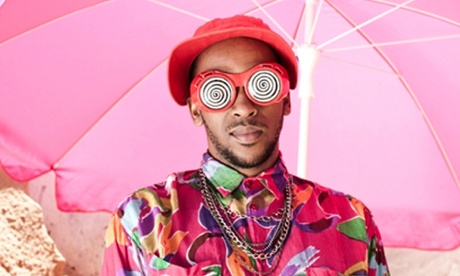
Two decades on from the end of minority rule, gritty, homemade electro is one of the most important vehicles for self-expression in modern democratic South Africa. It all started in mid-90s Johannesburg with kwaito. Originally inspired by Frankie Knuckles and Marshall Jefferson 12-inches imported from the US, this was a shuffling revamp of house music with found sounds, leisurely 90bpm drums and syrupy rapping flows in Tsotsitaal, Zulu, Afrikaans and English.
A colourful expression of freedom, kwaito quickly evolved from unknown ghetto subculture into national way of life. Since then, the beats have been skewed into innumerable shapes: from DJ Spoko’s barmy “Bacardi house” to Nozinja’s Soweto dance craze Shangaan electro.
South African star Spoek Mathambo is the co-director of Future Sound Of Mzansi, a new documentary that casts light on these scenes and their common musical heritage. Mathambo was immersed in diverse Joburg sounds from an early age, and the creation of a free, democratic republic had a profound effect on South African youth culture. He explains simply, “Growing up here meant the freedom to be able to get out.” Step by step, township by township, these daring, mutating styles soon became a real source of empowerment for young people, who began to explore beats from neighbouring townships, different provinces, and different countries. “And that allowed the scene to really explode,” Mathambo adds.
Film-making became a learning experience for Mathambo and fellow director Lebogang Rasethaba, who collected testimonies from legions of obscure, backstreet producers, dancers, MCs and partygoers. “It’s about capturing the reality of something happening right now,” says Mathambo. “I think a lot of the stories are really vibrant, but no one has cared to contextualise it or see how things relate across the country.” The latest fledgling music scene, he suggests, is the unpronounceable Qgom, in the eastern province of KwaZulu-Natal. In contrast to the four-to-the-floor gloss of Durban kwaito, the “Qgom revolution” mixes traditional Maskandi sounds with modern hip-hop.
It’s only one undiscovered scene of thousands, reckons Mathambo. There’s no single, definitive sound of post-apartheid youth. “The point is that the future’s now,” he says. “There’s so much exciting stuff that people don’t even know about in South Africa, let alone outside of it. Most exciting are the things that are happening that I will learn about in five years, that are cooking in some kid’s bedroom in some remote area. I don’t think anyone can give you any conclusive idea of what’s actually happening in South Africa.”

